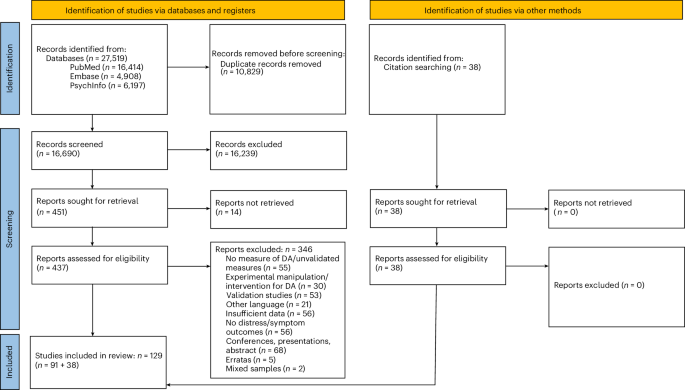Death Anxiety and Psychopathology
Published in Behavioural Sciences & Psychology

When we first began this meta-analytical project, we wanted find the message within the noise. Across many individual studies, researchers had been reporting empirical data suggesting the presence of an intricate relationship between death anxiety and psychological symptoms such as depression, anxiety, stress, obsessive compulsive disorder, posttraumatic stress disorder, and others. However, the picture remained fragmented as the relationships were sometimes positive, sometimes negative, and not always statistically significant.
To make sense of the vast empirical data, we decided to perform a meta-analysis. We gathered data from 129 studies, encompassing over 34,000 participants. We included both general population and clinical samples, aggregating correlations between validated measures of death anxiety and various indicators of psychological distress or psychopathology.
The studies were conducted across 38 different countries over the past 58 years. The most frequently assessed distress outcomes were depression and general anxiety. Only 15 studies (2,175 participants) included a clinical sample (with symptoms or diagnoses of mental disorders) and 31 studies included participants with a medical condition (e.g., cancer, HIV, Huntington’s disease).
The results were consistent and statistically robust:
- Death anxiety was moderately associated with distress outcomes, including:
- General anxiety: r = .42
- Depression: r = .41
- Distress: r = .35
- Composite distress (including anxiety, depression, and stress): r = .40
- COVID-19 anxiety: r = .41
- It was also associated with more clinical symptomatology:
- General psychopathology: r = .31
- PTSD symptoms: r = .33
- OCD symptoms: r = .66 (based on a smaller number of studies)
Interestingly, the association was stronger in samples with medical conditions, suggesting that heightened awareness of mortality may amplify the link between death anxiety and distress.
This wasn’t a straightforward synthesis. The literature is highly heterogeneous, and most studies used cross-sectional designs with varied methodologies. Moreover, a majority of the included studies were of lower quality.
However, despite these methodological caveats, the signal was clear: death anxiety is consistently correlated to psychological suffering across a range of symptoms. From a clinical perspective, the results suggest that death anxiety should not be sidelined as a philosophical or spiritual concern. It might be a transdiagnostic vulnerability factor—a background process that amplifies or maintains distress across different mental disorders.
This meta-analysis lays the foundation for future research that treats death anxiety not as a fringe construct, but as a core psychological dimension. Future work should:
• Use longitudinal and experimental designs to establish causality
• Explore interventions that directly target death anxiety to reduce symptom severity across disorders
• Investigate death anxiety's role in treatment outcomes, recovery, and relapse
Death touches a nerve. Quietly, constantly. It shapes how we live, how we suffer, and how we heal. This meta-analysis suggests that its influence is not just philosophical, but measurable, meaningful, and perhaps even clinically actionable. We hope our work invites researchers and clinicians to give this construct the empirical attention it deserves. After all, what could be more universal or more psychologically potent than the fear of our own finitude?
Follow the Topic
-
Nature Human Behaviour

Drawing from a broad spectrum of social, biological, health, and physical science disciplines, this journal publishes research of outstanding significance into any aspect of individual or collective human behaviour.
Your space to connect: The Psychedelics Hub
A new Communities’ space to connect, collaborate, and explore research on Psychotherapy, Clinical Psychology, and Neuroscience!
Continue reading announcement





Please sign in or register for FREE
If you are a registered user on Research Communities by Springer Nature, please sign in